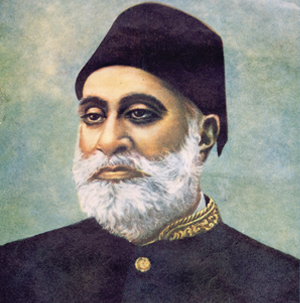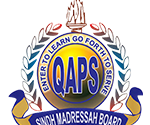Founder SMB

Khan Bahadur Hassanally Effendi
The founder Sindh Madrassah Board est 1885
Hassanally Effendi was born on 14th August 1830 in a respectable family of Akhunds in Hyderabad, Sindh. While still very young, he lost his father and was brought up by his elder brother. According to the tradition of his family, he was enrolled in a local maktab to read holy Quran and learn Arabic and Persian. After completion of this traditional education, he got a job in the office of the Deputy Collector of Naushehro. There he developed friendship with one of his Christian colleague who encouraged him to learn English.
By that time, a vast majority of Muslims had kept themselves aloof from everything related to English, including their language. But, Hassanally held a different point of view. He thought that there was immense wealth of literature and knowledge in English, which ought to be untapped for the intellectual and material progress of the Muslims. He was of the view that the language was merely means of communication and it had nothing to do with the acts of those who spoke it. Hence,he devoted his leisure hours in learning English and acquired proficiency in it. As he came across great works of English literature, he became very fond of reading, which became his hobby.
This was the time when river Indus served as means of transportation, as roads had yet not been developed and land routes were insecure. The British established 'Indus-Flotilla' a system of transportation based on a special type of boats. The town of Jherrick, a river-port some sixty miles north of Karachi, emerged as the headquarters of the Indus Flotilla. This establishment had a core permanent staff as to keep an account of the incoming and outgoing quantities of goods. Hassanally was offered a job, which he joined as it offered him relatively more time for his passion: reading English literature.
Sometime in the mid 1860s when Hassanally was about thirty-five he met Mr. Middleton, the chief judge of the highest court in the province of Sindh called the 'Saddar Court.' The judge had arrived for crossing Indus by a ferry. However, the judge decided to spend the night at port and to cross the river the following day. After dinner when everybody retired, he saw Hassanally reading an English book by the dim light of an oil lamp. After the introductions were over, a conversation ensued. The judge was pleasantly surprised to know about the grasp of Hassanally on a variety of subjects. He was even more surprised to know that the person he was talking to was a Muslim.
and was well versed with Muslim customs and practices, as the court faced immense difficulties in understanding the contents of applications filed by Muslims in local languages. He had been looking for a person to assist the court especially in the matters relating to Muslims but was unable to find such a person as there was not even a single English-knowing Muslim available for that job in the entire province. But now in Hassanally he found a perfect match for his need and offered him immediately an appointment in his court at Karachi on almost double of Hassanally's existing salary. He accepted the offer and shifted to Karachi to assume his new responsibilities.
As they started working together, Hassanally impressed the judge with his legal acumen and grip over the finer points of law to such an extent that the judge got him special permission to practice law without even having a formal qualification in law. This proved to be a turning point in Hassanally's life.
This was the time that there was not even single Muslim advocate except him in the entire Sindh. All of the lawyers in Sindh were Hindus while some of them were Christians and Zoroastrians. In these circumstances he had no support base and had to prove his worth against well-established lawyers. But, he took it as a challenge and devoted each ounce of his energy to his new profession. His interest and devotion towards his job earned him respect in the legal fraternity and all Muslims and he was offered the most prestigious position of the Public Prosecutor of Sindh. The distinction of his appointment was that he was the first non-European lawyer in Sindh to be appointed to that position. Another distinction was that he held that office for fourteen years, setting a record.
Hassanally Effendi was a man of rare talents. He had good knowledge of foreign languages like Persian, Arabic, English, Turkish, Latin and French. He offered prayers regularly at proper times throughout his life. After mosques at Sindh Madressah were constructed, Hassanally made it a point to offer Friday prayers every week regularly there, the routine that he observed till his departing from this world.
In private life also, Hassanally Effendi observed proper routine throughout his life. In summer as well as in winter, he used to get up at five o' clock in the morning. After having bath and offering prayers he used to read holy Quran. After that he went for a morning walk, where the news of the day was read to him. At nine o'clock he would engage himself in learning a foreign language and after that he would dress up and had his breakfast.
Hassanally Effendi did not allow any serious work to interfere with his sleep, which he considered the restorer of consumed energy. A full night's rest always made him look fresh again in the morning and ready to go through the duties of the day with renewed vigor. This schedule helped him a lot not only keeping him healthy throughout his life, but also enabled him to contribute extraordinarily towards the causes he had chosen for himself to work for.
These habits greatly helped him in establishing himself in his profession. Once established, Hassanally directed his energies towards the greater cause of the welfare of his Muslim brethren, not only in Sindh and India but much beyond that. He founded an association under the name of 'Anjuman-e-Islam' and was elected its president. The main objective of the association was to help Muslims during the period of their sufferings, safeguard their rights and spread education amongst them.
Hassanally Effendi acquired the land for SMB SMI school from kmc and dream to establish Sindh Madressatul Islam school came true on 01 September 1885, when Sindh Madressatul Islam was formally opened. A ceremony was arranged to mark the beginning of the institution, to which he invited a couple of friends and well wishers. Hassanally spoke for about two hours in that function in which he described the social and economic conditions of the Muslims of Sindh and the measures that he and his friends were taking to improve them.
By 1895, Hassanally Effendi in this cause had turned the institution of Sindh Madressatul Islam into a center of excellence. It consisted of a high school, three primary branches of Sindhi, Urdu and Gujrati. In this institution, the Quran classes and religious instructions were taught regularly. A group of highly dedicated teachers had converted themselves in a spirited team around the dream of Hassanally Effendi. The institution had already started producing the generations of educated Sindhi Muslim.
Alma matter of Quaid e Azam M A Jinnah SMB Sindh Madressah Islam school Karachi
Having achieved his objectives successfully Hassanally breathed his last in the afternoon of 20th August 1895, at Hassanally Hall located on the McLeod Road (presently known as I.I. Chundrigar Road) of Karachi. At first it was contemplated that he should be buried in the compound of Sindh Madressah. But it was noted that he had always desired that he should be buried in Hyderabad. Respecting his desire his body was taken in a special train from Karachi to Hyderabad, where he was laid to rest amidst thousands of his friends, family members, teachers and students of SMI.
In addition to Quaid-e-Azam M A Jinnah, Sindh Madressah school also has educated several leading lights of Pakistan including Sir Shahnawaz Bhutto, Sir Abdullah Haroon, Sir Ghulam Hussain Hidayatullah, Khan Bahadur Mohammad Ayub Khuhro, Shaikh Abdul Majid Sindhi and others. It was in this background that Syed Ghulam Mustafa Shah, an alumnus of SMI and renowned educationist used to call SMI "Child of Sindh and Mother of Pakistan." Besides the freedom fighters SMI has produced great educationists, jurists, soldiers and men of letters: some of them are: Allama I.I. Kazi, Allama Umer Bin Mohammad Daudpota, A.K. Brohi, Ali Ahmed Brohi, Lt Gen Ghulam Mohammad Malik and several others who constitute its proud Roll-of-Honor.
Hassanally Effendi (1830-1895)
The Founder of Sindh Madressatul Islam Board.
